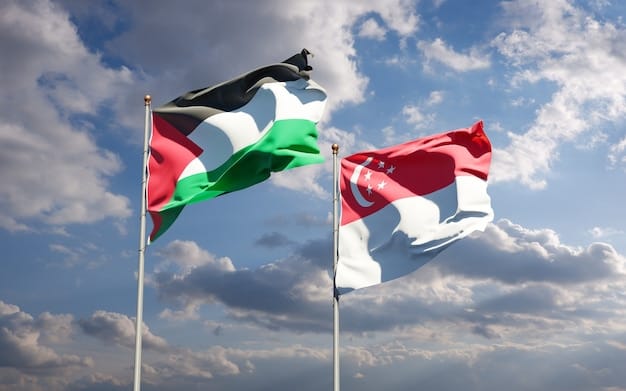Singapore, Malawi Advance Article 6 Carbon Credit Cooperation with New Agreement

• The two countries signed an MoU to develop an Article 6.2-aligned carbon credit implementation agreement that will allow Singapore’s carbon-taxed emitters to offset up to 5 percent of their emissions.
• The partnership aims to identify high-quality mitigation projects that support both countries’ NDCs and deliver co-benefits such as jobs, community resilience, and environmental protection.
• Singapore continues to expand its Article 6 pipeline, having already secured nature-based credits worth $76 million across Ghana, Peru, and Paraguay.
Singapore and Malawi Set Out Joint Article 6 Pathway
Singapore and Malawi have opened a new chapter in bilateral climate cooperation with a memorandum of understanding focused on developing carbon credits aligned to Article 6 of the Paris Agreement. The agreement was signed on 20 November on the sidelines of the Cop 30 climate summit, where talks on carbon markets and international cooperation have gained momentum.
The MoU establishes a framework for both countries to work towards a legally binding implementation agreement under Article 6.2. This next step will determine how credits are generated, transferred, verified, and used by Singaporean companies, and how Malawi secures climate and development gains from the partnership.
Building a Pipeline of Article 6-Compliant Projects
Under the MoU, Singapore and Malawi will identify mitigation activities that can qualify under Article 6 rules while supporting each country’s nationally determined contribution. The focus will be on projects that deliver measurable emissions reductions alongside social and environmental co-benefits.
Singapore plans to allow carbon-tax-liable companies to purchase eligible credits from these projects to offset up to 5 percent of their taxable emissions. The approach is designed to deepen private-sector engagement in international mitigation, while maintaining the integrity of Singapore’s domestic carbon-pricing regime.
Grace Fu, Singapore’s minister for sustainability and the environment, said the agreement aims to show what credible cooperation can deliver. “I hope that our co-operation will demonstrate how high-quality carbon credits can credibly raise global climate ambition, and bring about tangible benefits for local communities, such as environmental protection, improved access to energy, water and food security, and the creation of good jobs,” she said.
Expanding a Growing International Carbon Market Strategy
The partnership with Malawi forms part of Singapore’s broader effort to build out a network of Article 6-enabled relationships. The country has now signed similar MoUs with 10 other governments as it works to advance high-integrity international carbon markets that comply with emerging global rules.
In September, Singapore deepened this strategy with an agreement to purchase $76 million worth of nature-based carbon credits. The deal covers 2.17 million credits generated by four projects in Ghana, Peru, and Paraguay, secured through its cooperation frameworks with those countries. These arrangements help Singapore diversify its credit portfolio while providing host nations with finance for conservation, land-use transitions, and community development.
For Malawi, engagement with Article 6 partners offers access to performance-based finance for mitigation activities at a scale that is otherwise challenging to secure. The country’s climate priorities include forest conservation, renewable energy deployment, sustainable agriculture, and local resilience programmes — all areas where Article 6-aligned projects can be structured.
RELATED ARTICLE: Singapore Issues Practical Guidance to Advance Adoption of Singapore-Asia Taxonomy for Transition Finance
What Executives and Investors Should Track
The Singapore-Malawi MoU lands at a time when expectations for Article 6.2 are shifting. Companies and investors are watching to see how countries translate political commitments into operational rules, especially around corresponding adjustments, monitoring requirements, and benefit-sharing arrangements with local communities.
For Singapore’s regulated emitters, the development of an expanded pool of approved credits could open new compliance strategies within the limits of the national carbon tax. For climate-focused investors, the agreement points to a pipeline of projects that may attract blended finance or corporate demand once the implementation agreement is finalised.
Malawi’s participation also adds signals about the growing interest among lower-income countries in shaping Article 6 markets in ways that reflect national development priorities. Ensuring equitable benefit sharing, transparent accounting, and community safeguards will be critical to maintaining confidence in these arrangements.
A Step with Broader Global Relevance
At Cop 30, where negotiators are attempting to resolve remaining gaps in international carbon market rules, the Singapore-Malawi partnership offers a concrete example of how governments are moving forward even as global negotiations continue. Countries that can operationalise bilateral Article 6 cooperation early may shape standards and expectations that influence future market norms.
As the implementation agreement takes shape, the outcome will be closely watched across the carbon markets community. Both Singapore and Malawi are positioning this cooperation as a model for how climate finance, private-sector participation, and national climate strategies can align under Article 6 — a topic central to the next phase of global climate governance.
Follow ESG News on LinkedIn









